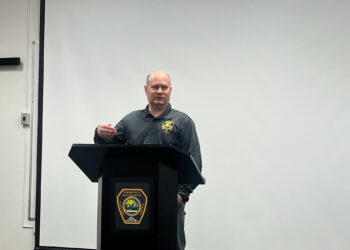Byrne talks investment
By Emily Wolfe Explore Big Sky Managing Editor
BUTTE – Montana’s mountains and minds are on par with the best in the world, but we’re not broadcasting that effectively: This was one of the recurring themes at the sixth annual Montana Economic Development Summit, held Sept. 16 -17, at Montana Tech of the University of Montana in Butte.
Organized by U.S. Sen. Max Baucus, the summit drew more than 3,000 people from around the state and country. Tech cancelled classes for the two days, hosting talks in its library and engineering, geology, chemistry and natural science buildings, as well as its 2,000-person HPER sports complex.
Keynote speakers included Google Executive Chairman Eric Schmidt, Facebook CEO Sheryl Sandberg, Spacex and Tesla Motors CEO Elon Musk and ConocoPhillips CEO Ryan Lance.
More than 30 panels featured topics from the Bakken as an economic driver, to international business, the future of wind and biofuels in Montana, protecting intellectual property, biochemicals, timber and agriculture. The rooms were packed, many with standing room only.
 Elements needed for significant growth exist in Montana, according to the speakers at an afternoon panel called “Cultivating the Ecosystem of Startups.”
Elements needed for significant growth exist in Montana, according to the speakers at an afternoon panel called “Cultivating the Ecosystem of Startups.”
“This is the best place to do business and raise a family,” said Joe Fanguy, president of the Missoula-based business incubator, MonTEC. “There’s so much opportunity here we haven’t even begun to capitalize on. It’s all right here, you guys are all it,” he said, speaking to a group of around 200.
The state is on the “tipping edge,” echoed Amy Stursberg, Executive Director of the Blackstone Charitable Foundation, part of the international investment and advising firm Blackstone. “There’s talent here, possibility here. People are enthusiastic, willing to roll up their sleeves and get it done.”
The challenge, Stursberg said, is money.
Even the summit itself is under-leveraged, said Dawn McGee, president of the Montana-based Goodworks Ventures, at that panel.
“Why are there not more people here from out of state? To see [Facebook CEO] Sheryl Sandberg – there are something like 17 CEO’s in a 48-hour period. We have to get out to the rest of the world what is happening, the quality of the talent, the resources. I travel around the country, and people with a lot less do a lot better with marketing.”
Leveraging Montana
If the elements are here, it’s up to the residents and those doing business in Montana to tell the world, said Delta Airlines CEO Richard Anderson at a discussion about travel and tourism.
“How do you distribute Montana?” Anderson asked. “You have a gem of a state.”
Delta runs nonstop flights from Atlanta to Bozeman, Missoula and Kalispell, and is adding Billings next spring. The airline had double-digit growth here in the last two years, driven by demand.
 Yellowstone Club principal owner Sam Byrne has worked with Delta and the state through the Y.C. in recent years, helping establish new direct flights into Bozeman-Yellowstone International Airport. He spoke alongside Anderson to an audience of about 300 in Tech’s library auditorium.
Yellowstone Club principal owner Sam Byrne has worked with Delta and the state through the Y.C. in recent years, helping establish new direct flights into Bozeman-Yellowstone International Airport. He spoke alongside Anderson to an audience of about 300 in Tech’s library auditorium.
“In the last five years, we’ve invested more than $550 million in Montana,” Byrne said, referring not only to real estate purchases but also airline investments. “That number will more than double in the next 10 years.”
Byrne’s investment firm, CrossHarbor Capital Partners, also owns The Club at Spanish Peaks and is set to acquire Moonlight Basin in early October. Through a new partnership between CrossHarbor and Boyne Resorts, the Club at Spanish Peaks and Moonlight will now operate as one with Big Sky Resort.
Having conglomerated the largest ski area in the country, Byrne is at the forefront of Montana tourism. But Big Sky’s 400,000 annual skier visits are trivial compared with the big resorts in Colorado and Utah.
Byrne’s commitment to invest in the southwest Montana market was based largely on the strength of Bozeman’s airport, the largest in Montana after a 2011 renovation and the second largest in the northern Rockies.
“It’s critical to develop business nationally,” Byrne said. To accomplish this, he says Big Sky will need help from the state and all Montana ski areas.
Business friendly, outdoor economy
Passing business-friendly state legislation is key to the state’s growing business community, Anderson said, adding that one of Delta’s main hubs is Atlanta, Ga. for exactly that reason. “You’ve got to continue to think about… creating the kind of environment that businesses want to relocate to.”
For Montana, another part of that is inherent to its northern Rockies location – an asset that must be protected and nurtured, according to panelists in “Boosting Montana’s Economy through the Great Outdoors.”
“Americans spend $646 billion on outdoor recreation every year,” said panelist I Ling Thompson, Vice President of Marketing and Communications for the Boulder, Colo.-based Outdoor Industry Association. “Even during the recession, the average increased every year by 5 percent.”
People spend more on outdoor recreation than on cars, pharmaceuticals or utilities, Thompson said. “You’re at the forefront of a growing industry. More than half of all Americans participate in outdoor recreation. That’s 50 percent of people spending money.”
 According to 2012 OIA research, nearly $6 billion is generated by outdoor recreation spending in Montana, generating $403 million in state and local tax revenue and nearly 65,000 jobs.
According to 2012 OIA research, nearly $6 billion is generated by outdoor recreation spending in Montana, generating $403 million in state and local tax revenue and nearly 65,000 jobs.
Another panelist, Alex Philp, president of Missoula software company GCS Research, said the outdoors contribute directly to his bottom line.
“We write software, … but what defines us and what defines my staff – what allows us to recruit them – is love of public lands. The guys and gals that work with me… can live anywhere.”
In the past, Philp said, he flew to cities to solicit business from the world’s largest companies. Now he flies executives to Missoula. “Instead of just another meeting on their turf, I was transforming their lives.”
Global economy
Like everywhere else, Montana must compete in the global market.
During his keynote on Sept. 16, Google Executive Chairman Eric Schmidt named a litany of problems with the world economy: globalization hollowing the middle class; manufacturing jobs shifting overseas; commerce moving online without replacement jobs being created; and aging baby boomers.
“[But] before we sink into this despicable terrible state, there is actually an alternative model,” Schmidt said, suggesting “completely new ways of thinking about artificial intelligence,” rethinking transportation with self-driving cars and better use of airspace in cities.
“The future of work is in fact going to be great for humans, and I think it starts with innovation. That’s what this conference is about.”











